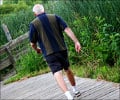A new study observes the association of physical activity with major heart diseases in elderly people.

‘At least 20 minutes of moderate to vigorous physical activity daily should be recommended for cardiovascular benefits in old age.’





But relatively few studies have looked exclusively at whether exercise in later life can help ward off heart disease and stroke in old age.To plug this knowledge gap, the researchers drew on data from the Progetto Veneto Anziani (ProVA), a study of 3099 older Italians (65 and above).
Initial assessments, including a detailed medical history, physical examination, scans, and blood tests were carried out between 1995 and 1997, with two further assessments 4 and 7 years later.
At the start of the study, women were more likely than men to have 4+ coexisting conditions, with a higher prevalence of osteoarthritis, osteoporosis, and chronic kidney disease; chronic obstructive pulmonary disease (COPD) and diabetes were more common among the men.
Participants filled in questionnaires on their physical activity levels at each of the time points. Moderate physical activity included walking, bowls, and fishing, while vigorous physical activity included gardening, gym work-outs, cycling, dancing, and swimming.
Advertisement
Changes in physical activity patterns were defined as: stable-low (inactive-inactive); high-decreasing (active-inactive); low-increasing (inactive-active); and stable-high (active-active).
Advertisement
The health of all the participants was then tracked through linkage to hospital discharge records and death certification up to the end of December 2018.
The final analysis included 2754 participants with complete data, of whom 1398 were women (60%). During the monitoring period, 1037 new diagnoses of heart disease, heart failure, and stroke were made.
Increasing levels of physical activity as well as maintaining an active lifestyle over time were associated with lower risks of cardiovascular disease and death in both men and women.
The largest risk reduction was observed for new cases of coronary heart disease and heart failure in late old age. No significant association between physical activity and stroke was observed.
Most of the participants had stable active physical activity patterns over time. Patterns of stable-high physical activity were associated with a significantly (52%) lower risk of cardiovascular disease among men compared with those with stable-low patterns.
The greatest benefits seemed to occur at the age of 70. The risk was only marginally lower at the age of 75, and no lower at the age of 80-85, suggesting that improving physical activity earlier in old age might have the most impact.
This is an observational study, and cannot establish cause. Researchers acknowledge that the study relied on participant recall, that physical activity levels were subjectively assessed, and that no data were available on mid-life physical activity levels, all of which might have influenced cardiovascular risk profiles in late life.
These results suggest that public health policies should be targeted at promoting or beginning physical activity in mid-and early late life, given a probable greater effectiveness in reducing cardiovascular risks.
Source-Medindia















